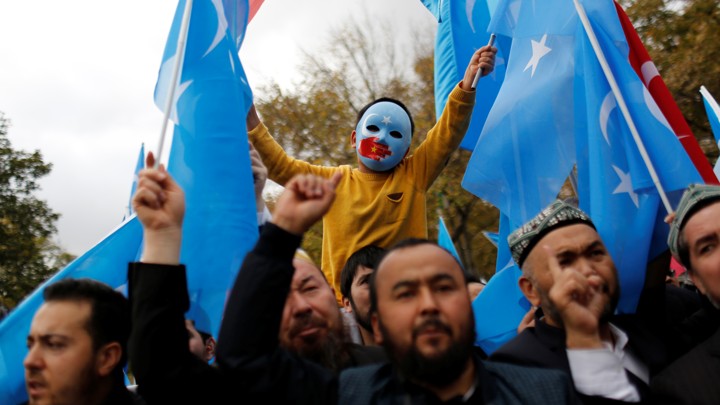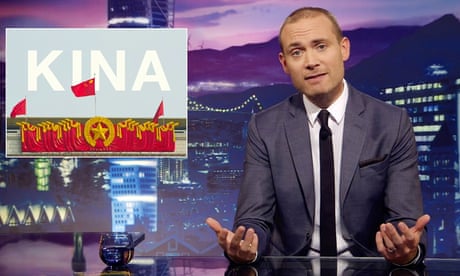By Josh Rogin

World leaders take part in a working session on the second day of the Group of 7 summit in Biarritz, France, on Sunday.
BIARRITZ, France — The clear imperative for the Western world to come together and confront China’s rising internal repression and external economic aggression should have been enough to overshadow any differences between strained allies at this weekend’s Group of 7 meetings.
But no such luck.
The members of the G-7 — which includes the United States, France, Britain, Germany, Italy, Canada and Japan — created this multilateral mechanism to bring to bear their joint economic power on the solution of great challenges.
The members of the G-7 — which includes the United States, France, Britain, Germany, Italy, Canada and Japan — created this multilateral mechanism to bring to bear their joint economic power on the solution of great challenges.
China’s economic expansion, fueled by various unfair trade practices and directly linked to the Chinese Communist Party’s political and strategic objectives, is unquestionably the free world’s greatest test.
But with blame assignable to both the Trump administration and European members of this once-vaunted group, the best anyone hopes for this weekend in this scenic French retreat is that the G-7 summit won’t devolve into another diplomatic disaster akin to what took place in Canada last year.
President Trump hammered home his criticisms of China’s economic aggression before he even got on the plane, ordering U.S. companies to start looking for ways to leave China, raising tariffs on Chinese goods and calling out Beijing on its rampant intellectual property theft.
On Friday, President Trump referred to his confrontation with China over its economic aggression as “more important than anything else right now — just about — that we’re working on.”
Here in France, most media reports focused on President Trump’s offhand remark that he has had “second thoughts” on everything, including his trade war with China.
But with blame assignable to both the Trump administration and European members of this once-vaunted group, the best anyone hopes for this weekend in this scenic French retreat is that the G-7 summit won’t devolve into another diplomatic disaster akin to what took place in Canada last year.
President Trump hammered home his criticisms of China’s economic aggression before he even got on the plane, ordering U.S. companies to start looking for ways to leave China, raising tariffs on Chinese goods and calling out Beijing on its rampant intellectual property theft.
On Friday, President Trump referred to his confrontation with China over its economic aggression as “more important than anything else right now — just about — that we’re working on.”
Here in France, most media reports focused on President Trump’s offhand remark that he has had “second thoughts” on everything, including his trade war with China.
But President Trump was not expressing regret or signaling a change in policy.
In the same series of questions, he said about the trade war: “It has to happen.”
The president is escalating pressure on China even though that puts his economic accomplishments at risk.
The president is escalating pressure on China even though that puts his economic accomplishments at risk.
Make no mistake, he’s committed to seeing this through.
President Trump’s confused messaging is counterproductive.
President Trump’s confused messaging is counterproductive.
But his basic thrust is on point.
China must change its predatory economic and industrial policies, by persuasion or pressure.
If the Chinese government won’t play by basic international rules, Western free-market democracies will have no choice but to defend themselves through disengagement and decoupling that will undoubtedly have negative collateral economic consequences.
Any honest analysis must acknowledge that the Chinese government has not yet changed its behavior and that therefore President Trump’s strategy has not yet worked.
Any honest analysis must acknowledge that the Chinese government has not yet changed its behavior and that therefore President Trump’s strategy has not yet worked.
But it’s obvious the chances of success would rise dramatically if European allies were on board.
Yet despite the fact that Europe faces the exact same threat from China’s economic aggression, European leaders here in Biarritz are saying that the onus for ending the trade war is on Washington, not Beijing.
French Emmanuel Macron said he wanted to persuade G-7 leaders (meaning President Trump) to “avoid this trade war” and reduce tensions.
Yet despite the fact that Europe faces the exact same threat from China’s economic aggression, European leaders here in Biarritz are saying that the onus for ending the trade war is on Washington, not Beijing.
French Emmanuel Macron said he wanted to persuade G-7 leaders (meaning President Trump) to “avoid this trade war” and reduce tensions.
British Boris Johnson said he didn’t like tariffs and wanted “trade peace.”
European Council Donald Tusk warned that President Trump’s use of tariffs “as a political instrument” could cause a global recession.
None of them mentioned China’s role in the dispute or its resolution.
President Trump could blunt criticism of his China tariffs by backing off his concurrent tariff threats on our allies.
President Trump could blunt criticism of his China tariffs by backing off his concurrent tariff threats on our allies.
The administration should focus on persuading European countries to join the pressure campaign against China, which is the real trade priority.
Privately, many European officials hope their countries’ stagnant economies might benefit from the U.S.-China fight, as companies from third countries pick up the business American companies leave behind.
Privately, many European officials hope their countries’ stagnant economies might benefit from the U.S.-China fight, as companies from third countries pick up the business American companies leave behind.
Also, European countries that want money from China’s One Belt, One Road initiative don’t want to anger the Chinese Communist Party before their checks clear.
A more diplomatically savvy Trump administration might point out to Europeans that China’s economic aggression comes at the expense of Europe’s own goals and interests, including confronting climate change, promoting sustainable development and protecting free markets.
The Trump administration also needs to offer European countries more real alternatives to Chinese development funds, which almost always come with political strings, corruption and ecological consequences.
According to White House read-outs, Trump discussed Hong Kong and the technology giant Huawei with his G-7 counterparts.
A more diplomatically savvy Trump administration might point out to Europeans that China’s economic aggression comes at the expense of Europe’s own goals and interests, including confronting climate change, promoting sustainable development and protecting free markets.
The Trump administration also needs to offer European countries more real alternatives to Chinese development funds, which almost always come with political strings, corruption and ecological consequences.
According to White House read-outs, Trump discussed Hong Kong and the technology giant Huawei with his G-7 counterparts.
What’s missing is a Trump administration explanation of how China’s crackdown on dissent and its predatory economic expansion are two parts of the same Chinese Communist Party strategy, namely to undermine and eventually supplant the free and open international order the United States and European economies depend on.
The bottom line is that President Trump and Europe must make up and find a way to get along, at least for the next year and maybe for four more years after that.
The bottom line is that President Trump and Europe must make up and find a way to get along, at least for the next year and maybe for four more years after that.
There will be no joint statement at this year’s G-7 because there’s no consensus on what the G-7 stands for.

 Uighur demonstrators in Turkey wave East Turkestan flags in a protest against China.
Uighur demonstrators in Turkey wave East Turkestan flags in a protest against China.







 Emmanuel Macron and Xi Jinping during a news conference in Paris, on March 25.
Emmanuel Macron and Xi Jinping during a news conference in Paris, on March 25. 











 Protestors carrying Tibetan flags shouted slogans against Xi during his visit in Prague in 2016.
Protestors carrying Tibetan flags shouted slogans against Xi during his visit in Prague in 2016.
